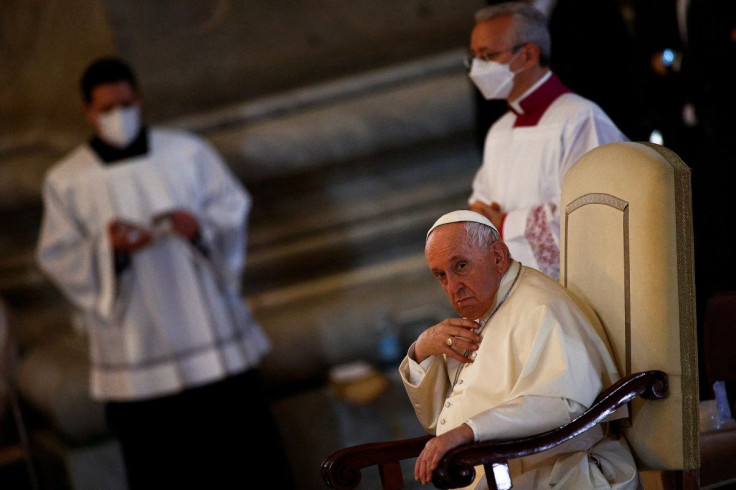Pope Condemns Cruelty Of Ukraine War At Easter Vigil Service

Pope Francis condemned the cruelty of the war in Ukraine on Saturday at an Easter vigil Mass he attended but at which he did not preside, presumably because of leg pain that has forced him to curtail activities.
The Mass was attended by Ivan Fedorov, the mayor of Melitopol, who was detained by Russian forces last month and later freed in a prisoner exchange.
Italian Cardinal Giovanni Battista Re replaced the pope as the main celebrant at the service, which involved a procession in near-total darkness up the central nave of Christendom's largest church.
The pope sat at the front of Saint Peter's Basilica in a large white chair on the side, appeared alert and stood during the reading of the gospel.
He read his homily while sitting but in his normal voice and later rose to baptize seven adult converts to Catholicism.
The pope departed from his prepared text to acknowledge the presence of Fedorov, his family and three Ukrainian parliamentarians sitting in the front.
He spoke of the "darkness of war, of cruelty".
"All of us pray for you and with you. We pray because there is so much suffering. We can only give you our company, our prayers and say to you 'courage, we accompany you,'" Francis said.
He ended by saying "Christ is risen" in Ukrainian.
The Vatican said Francis met privately with the Ukrainian delegation before the Mass.
Presiding at the Mass, which was attended by 5,500 people, would have required long periods of standing during the chanting and gospel readings, genuflecting at the altar.
The 85-year-old pope suffers from sciatica, which causes pain in one leg and results in a pronounced limp. Recently Francis also has had a flare up of pain in his right knee.
The condition appears to come and go.
A programme issued by the Vatican on Friday listed the pope as chief celebrant at the Saturday evening service. The Vatican gave no official reason for the change.
On Friday afternoon, the pope was well enough to walk the entire aisle both at the start and the end of a Good Friday service in the basilica but he did not prostrate himself on the floor as he normally does during that service.
He had to curtail some of his movements during a trip to Malta at the start of April and also had to ask a cardinal to stand in for him at a Mass in December.
The Holy Week activities, which culminate on Sunday, mark the first time since 2019 that the public has been allowed to attend following two years of COVID-19 restrictions.
On Easter Sunday, the most important day in the Christian liturgical calendar, he is due to say Mass in St. Peter's Square and then deliver his twice-yearly "Urbi et Orbi" (to the city and the world) message and blessing.
© Copyright Thomson Reuters 2024. All rights reserved.





















